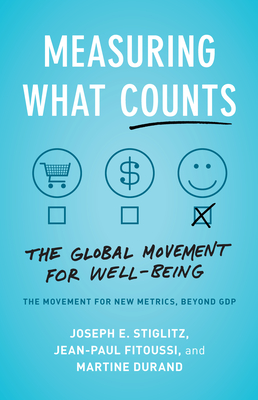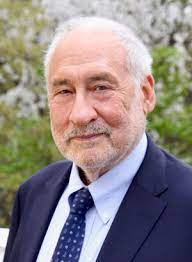

 New Press
New Press
Measuring What Counts: The Global Movement for Well-Being


Key Metrics
- Joseph E Stiglitz
- New Press
- Paperback
- 9781620975695
- 8.4 X 5.4 X 0.9 inches
- 0.6 pounds
- Business & Economics > Money & Monetary Policy
- English
 Secure Transaction
Secure TransactionBook Description
A bold agenda for a better way to assess societal well-being, by three of the world's leading economists and statisticians
If we want to put people first, we have to know what matters to them, what improves their well-being, and how we can supply more of whatever that is.
--Joseph E. Stiglitz
In 2009, a group of economists led by Nobel laureate Joseph E. Stiglitz, French economist Jean-Paul Fitoussi, and Nobel laureate Amartya Sen issued a report challenging gross domestic product (GDP) as a measure of progress and well-being. Published as Mismeasuring Our Lives by The New Press, the book sparked a global conversation about GDP and a major movement among scholars, policy makers, and activists to change the way we measure our economies.
Now, in Measuring What Counts, Stiglitz, Fitoussi, and Martine Durand--summarizing the deliberations of a panel of experts on the measurement of economic performance and social progress hosted at the OECD, the international organization incorporating the most economically advanced countries--propose a new, beyond GDP agenda. This book provides an accessible overview of the last decade's global movement, sparked by the original critique of GDP, and proposes a new dashboard of metrics to assess a society's health, including measures of inequality and economic vulnerability, whether growth is environmentally sustainable, and how people feel about their lives. Essential reading for our time, it also serves as a guide for policy makers and others on how to use these new tools to fundamentally change the way we measure our lives--and to plot a radically new path forward.
Author Bio
Joseph E. Stiglitz is an American economist and a professor at Columbia University. He is also the co-chair of the High-Level Expert Group on the Measurement of Economic Performance and Social Progress at the OECD, and the Chief Economist of the Roosevelt Institute.
A recipient of the Nobel Memorial Prize in Economic Sciences (2001) and the John Bates Clark Medal (1979), he is a former senior vice president and chief economist of the World Bank and a former member and chairman of the (US president's) Council of Economic Advisers. In 2000, Stiglitz founded the Initiative for Policy Dialogue, a think tank on international development based at Columbia University.
He has been a member of the Columbia faculty since 2001 and received that university's highest academic rank (university professor) in 2003. In 2011 Stiglitz was named by Time magazine as one of the 100 most influential people in the world. Known for his pioneering work on asymmetric information, Stiglitz's work focuses on income distribution, risk, corporate governance, public policy, macroeconomics and globalization. He is the author of numerous books, and several bestsellers.
His most recent titles are People, Power, and Profits, Rewriting the Rules of the European Economy, Globalization and Its Discontents Revisited, The Euro and Rewriting the Rules of the American Economy.
Source: Columbia University - Graduate School of Business
Videos














Community reviews
Write a ReviewNo Community reviews